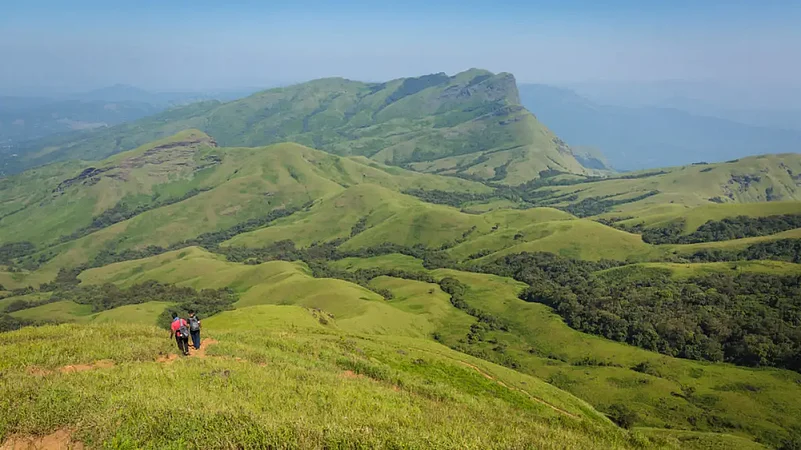On the route to Kudremukh, the scenery is breathtaking. Coffee trees that still await the first shower in Chikmagalur are drenched in white blossoms in Kudremukh. With no apparent effort, the land here grows coffee, palms, cardamom and mango with quite a few hills also given over to mosaic-like tea plantations. Kudremukh is a landscape designed entirely by rain and there is an ease to life in these parts that is obvious in the freshly painted villages and the clean streets.
Kudremukh Peak
At 6,214ft, this peak, which means the ‘horse-face hill’, falls before the town and requires a small hike up. On a clear day, the blue edge of the Arabian Sea is visible from here. The peak is closed to visitors in March and April.
Kudremukh National Park
The park, 10km from the town, consists mostly of evergreen rainforests and is extremely beautiful. But forests here are so thick that big game sightings are rare. Inside the park, you can stay at Kudremukh Forest Department’s Bhag wati Nature Camp. The camp closes during the dry season. Bookings are done through the Forest Department in Karkala (Tel: 08258-231183). Inside the forest are Hanuman Gundi Waterfalls (16km) and Ganga moola (12km), where the Tunga, Bhadra and Netravathi rivers originate, a scenic spot to trek up to.
Around Kundremukh
Kalasa
A good excursion from Kudremukh, past the lush slopes and cool air of the Ghats, is to the nearby temple town of Kalasa, where you’ll find the Sri Kalaseshwara Temple associated with the legend of Rishi Agasthya, who is said to have been born in a kalash (a water pot). The temple is primarily a shrine to Lord Shiva, but there are other, smaller shrines in the complex. Head out of town to see more interesting sights.
Topping the list are the Panchatirtha, the five sacred ponds: Rudra Tirtha is 5km from Silent Valley Resort, next is Vasishtha Tirtha at 6km, Amba Tirtha is 8km, Varaha Tirtha 30km and finally Naga Tirtha, 35km away. Close to Amba Tirtha is a huge boulder called Bheemana Kallu that bears a Sanskrit inscription stating that Sri Madha vacharya (the founder of the Dvaita school of philosophy) brought and placed it here with one hand. Duggappana Katte, a viewing point, is 5km from the Silent Valley Resort. At a similar distance is Kallubaavi, an unusual well dug out of rock, which goes quite deep. There are quite a few other temples in the vicinity.
Agumbe
The village of Agumbe lends itself to some excellent outdoor adventures — there are waterfalls and pools to bathe in, birds and snakes to spot and treks to build up your appetite. It is also where the famous television series, Malgudi Days, was shot. You can visit the house where Swami lived with his family, and even stay here as it is now a homestay. With an average annual rainfall of more than 8,000mm, this is one of the wettest places in India and the site of the Agumbe Rainforest Research Station, which carries out research in rainforest ecology. Interestingly, one of its main projects is to track the area’s king cobras using radio tagging. Numerous waterfalls and trails through the winding hills make Agumbe a trekking paradise. Carry all required equipment and supplies with you and do engage a guide as it’s very easy to get lost in the dense woods. It’s best to avoid trekking at night. The 850-ft-high Barkana Falls are 5km from Agumbe, after which a 3km trek affords gorgeous valley views. On the way back, take the route via the Jogi Gundi Falls. The water flows over stepped rocks and through a cave into a large pool.





















